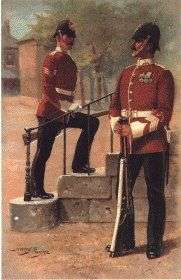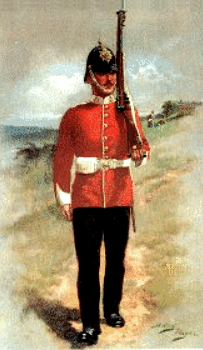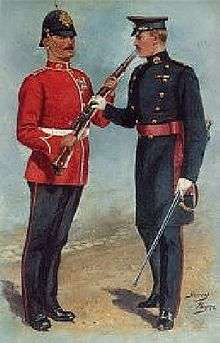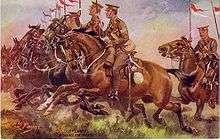Harry Payne (artist)
Biography
Henry Joseph Payne, born at Newington, London, the son of Joseph and Margaret Sophie Payne. His father was a solicitor's clerk. He married Susanna Terese Cossins at Camberwell on 16 June 1887 and they had no children.
With his brother, Arthur C. Payne, he produced many series of oilette postcards for Raphael Tuck & Sons and also did extensive work for Gale and Polden producing illustrations for their postcard series along with other military artists including Edgar Alfred Holloway, John McNeill, and Ernest Ibbetson.
In 1898, he and his brother Arthur created a series of chromolithographic and lithographic illustrations for an edition of Robert Browning's The Pied Piper of Hamelin.
Harry Payne was a part time volunteer soldier, serving with the Queen's Own West Kent Yeomanry. In 1905 he received the Imperial Yeomanry Long Service Medal, he then having the rank of sergeant.[1]
Legacy
His 1901 painting of the Royal Horse Guards crossing Horse Guards Parade was sold at Bonhams in 2007 for over £50,000.[2]
Gallery

 The Manchester Regiment in the 1880s
The Manchester Regiment in the 1880s Private of the East Lancashire Regiment in pre-1914
Private of the East Lancashire Regiment in pre-1914 The Duke of Wellington's Regiment in the 1880s
The Duke of Wellington's Regiment in the 1880s The 17th Lancers advancing
The 17th Lancers advancing
See also
| Wikimedia Commons has media related to Harry Payne (artist). |
Further reading
- Cane, Michael (1977). For Queen and Country: The Career of Harry Payne, Military Artist, 1858-1927. Kingston: Michael Cane. OCLC 28514215
- Harrington, Peter (2001). British Army Uniforms in Color as Illustrated by John McNeill, Ernest Ibbetson, Edgar A. Holloway and Harry Payne, c. 1908-1919. Atglen, PA: Schiffer. ISBN 0764313029 OCLC 47663780
- Harris, R.G., "Harry Payne - Military Artist," Tradition, No. 46, 1970, pp. 13–16.
References
- The Orders & Medals Research Society Journal, Vol 26 No 3, Autumn 1987, page 202.
- "Lewisham Council - 1968 Harry Payne Collection" (PDF). Retrieved 18 September 2009.
External links
- Anne S. K. Brown Military Collection, Brown University Library oil panels, water-colors, and prints by Harry Payne